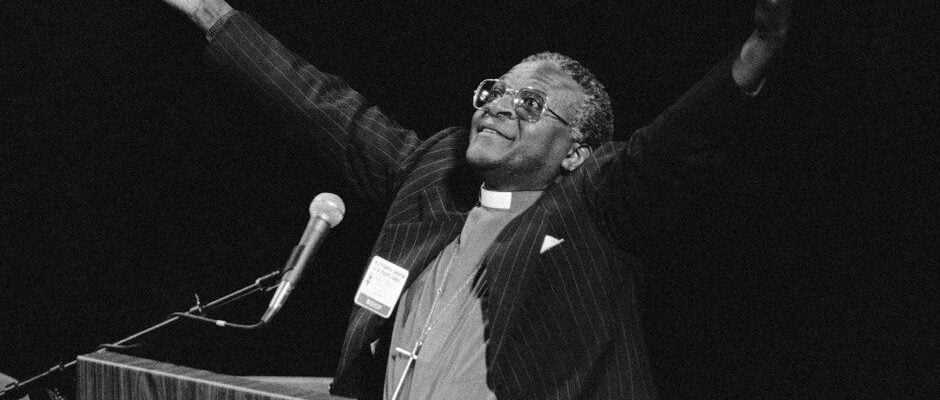Hero of the struggle against apartheid, the Nobel Peace Prize winner was a joyful and passionate man. On Boxing Day, at the age of 90, he returned to his paradise. This Saturday will take place his funeral.
This December 10, 1984 in Oslo, it was cool and beautiful. In his eternal purple surplice, Bishop Desmond Tutu, 53, is preparing to receive the Nobel Peace Prize, twenty years after Martin Luther King. The orchestra has just played the overture to “Orpheus and Eurydice” by Gluck, when a bomb threat interrupts the ceremony. Following King Olav V, the crowd of guests evacuates the university from the Norwegian capital. Thousands of curious gather on the square. We plan to continue the award ceremony in the street.
Also read:South Africa: Desmond Tutu’s coffin in Cape Town Cathedral
“Good idea, there will be more people and that’s good! Smiles Desmond Tutu. Finally, after much palaver, but no bomb, it was agreed to come back inside. The orchestra, meanwhile, has disappeared. No matter. Desmond Tutu, his wife, Leah, their four children and their friends and collaborators take care, with talent, of the show. At a moment’s notice, South African singers replace Norwegian musicians and sing the song of liberation, “God Bless Africa”. Clenched fists stand in the aisles, dances and joy crumple tuxedos and evening dresses. Never has a Nobel Prize-giving ceremony, usually polar and stiff, been so warm. “This is not a personal award but a prize to be shared with countless little people, heroes and unknown heroines. I am standing on their shoulders, ”the bishop had declared a few days earlier in New York.
Also read:Desmond Tutu, his life in pictures
This anecdote reveals nothing of the battles waged by this tiny giant who wore thin glasses, cherished rum and raisin ice cream, adored Sherlock Holmes and football on TV; but it tells a bit about the enthusiastic and determined man he was, day after day, without interruption, for ninety years. A character that Barack Obama considered his “compass”, and the Dalai Lama as his “spiritual elder brother”. In the middle of the apartheid winter, Desmond Tutu embodied the “invincible summer” of which Albert Camus spoke. The existence of the humble prelate, who blamed himself so much for wanting to be loved, was punctuated by Dantesque battles against all the injustices of which men are capable. Rich in mischief, laughter and tears, she knew how to flourish beyond incredible risks, in an unalterable courage driven by inexhaustible energy. The ingredients which, at the mercy of fate, sometimes make ordinary men or women into tutelary figures … Desmond Mpilo Tutu was one of them.
1975, in the township of Kasigo. The Dean of Johannesburg Cathedral with his mother-in-law, Johanna Shenxane, and Leah, his wife of twenty years. © Gallo Images via Getty Images
He was born on October 7, 1931 in Makoeten, a small town near the town of Klerksdorp, in what is now the North-West province, formerly Transvaal. His father is a teacher in a school reserved for blacks; his mother, a cleaning lady. Little Desmond does not live in misery but knows poverty. He contracted polio at the age of 4 and then contracted tuberculosis. These ordeals made him want to become a doctor, but his family could not afford to pay for his studies. He then follows the path of his father and becomes a teacher in the 1950s, three years of blackboard and chalk before resigning to protest against the ridiculous learning conditions reserved for blacks. Because, in the meantime, in 1948, apartheid was established. In 1955, he married Leah, also a teacher, in whose arm he would cross six decades. After the professorship, almost out of spite, the young man chooses the seminary. Ordained an Anglican priest at the age of 30 in 1961, he then went to study in London, where he obtained a master’s degree in theology from King’s College. Back home, he was appointed professor of theology at the University for Blacks of Fort Hare, where he met Steve Biko, founder of the Black Consciousness Movement. The spark. In the early 1970s, he returned to England and became deputy director of the World Council of Churches. Desmond Tutu is 41 years old and no one has really heard of him until then.
Find our full portrait in number 3791
Any reproduction prohibited
